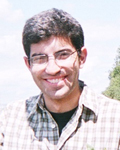2011, 2013
Daniel Asen
- Visiting Assistant Professor
- University of Pittsburgh

Abstract
This dissertation examines the modern reinvention of a field of traditional Chinese technical expertise—the forensic examination of dead bodies—as a case study of the role of science and professionalization in the construction of a modern social and political order in early twentieth-century China. At stake in the examination of dead bodies was the role that modern disciplines would play in defining expertise, the role of professionals in implementing modern governance, and the role of the imperial past in shaping modern China. This study contributes to our understanding of the hybridities of modernity, the cultural and social politics of “expert” knowledge, and the local inflections of science during its emergence as a global universal.
Abstract
The coroners who served in Beijing's local procuracy during the first decades of the twentieth century were unique witnesses to China’s transformation into a modern state and society. Many wondered whether coroners could serve the needs of the new order that arose in China after the collapse of the Qing in 1911. The techniques that they used to find cause of death had developed under the fallen empire, an ambivalent source of authority in a new intellectual climate that valorized Western science. This project traces the process through which Beijing’s new urban public debated and ultimately accepted coroners' indigenous field of expert knowledge as both a constituent element of Chinese modernity and an alternative to Western forensic science.

